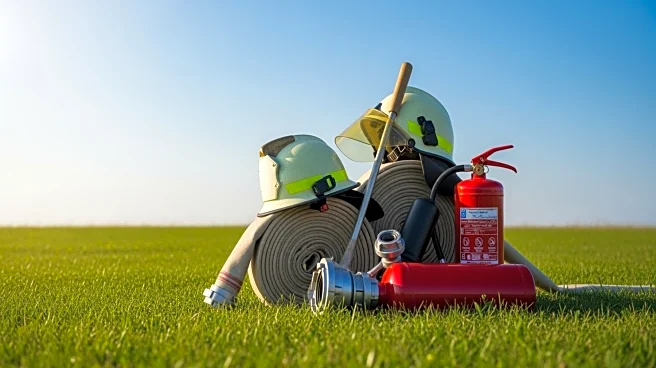What's Happening?
A significant fire on Langdale Moor, near RAF Fylingdales, which began on August 11, was finally declared no longer a major incident on September 23. The fire, which covered nearly 10 square miles at its peak, was tackled by a group of volunteers known
as the 'Farmy Army' alongside professional firefighters. Chris Ford, a key volunteer, played a crucial role in maintaining water supplies, earning the nickname 'The Water Guy.' The community's efforts are being commemorated with a special tractor run starting at Whitby Marina, featuring equipment used in the firefighting efforts. This event aims to thank the community and support recovery from the trauma of the fire.
Why It's Important?
The containment of the Langdale Moor fire highlights the critical role of community involvement in emergency situations. The collaboration between volunteers and professional services prevented the fire from reaching populated areas, showcasing the effectiveness of coordinated efforts in crisis management. This event underscores the importance of local knowledge and resources in managing natural disasters, potentially influencing future emergency response strategies. The successful containment without loss of life or property damage demonstrates the resilience and unity of the community, setting a precedent for handling similar incidents in the future.
What's Next?
The tractor run event serves as a moment of reflection and gratitude, potentially strengthening community bonds and encouraging continued collaboration in future emergencies. It may also prompt discussions on improving infrastructure and resources for rural firefighting efforts. Stakeholders, including local government and emergency services, might consider investing in better equipment and training for volunteers to enhance preparedness for future incidents. The event could also inspire other communities to organize similar initiatives, fostering a culture of proactive disaster management.
Beyond the Headlines
The Langdale Moor fire incident highlights the ethical and cultural dimensions of community resilience. It raises questions about the sustainability of relying on volunteer efforts in emergency situations and the need for systemic support. The event also reflects cultural values of solidarity and mutual aid, which are crucial in times of crisis. Long-term, this could lead to a shift in how rural communities prepare for and respond to natural disasters, emphasizing the integration of local knowledge and resources with formal emergency services.















